|
|
|
Sort Order |
|
|
|
Items / Page
|
|
|
|
|
|
|
| Srl | Item |
| 1 |
ID:
160126
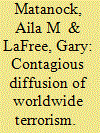

|
|
|
|
|
| Summary/Abstract |
Studies of the contagious spread of insurgency and conflict across national boundaries has generated a good deal of empirical research over time. While the contagious spread of terrorism has also been a policy concern, few empirical studies exist on the extent to which terrorism spreads contagiously. This article uses methods developed by criminologists to study the spread of crime to examine the worldwide diffusion of terrorism from 1970 to 2013. We distinguish between contagious increases (based on shared borders) and non-contagious increases (where no borders are shared). We define the “domino effect” as a particular type of contagious diffusion where high levels of terrorism spread to an adjoining country but also remain high in the host country. Our analysis shows that both contagious and non-contagious diffusion has been rare over the past 43 years, non-contagious diffusion is more common than contagious, and when contagious diffusion occurs, it is very likely to occur according to the domino effect.
|
|
|
|
|
|
|
|
|
|
|
|
|
|
|
|
| 2 |
ID:
138772
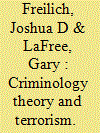

|
|
|
|
|
| Summary/Abstract |
In this short essay, we introduce readers to a special issue of Terrorism and Political Violence on criminological approaches to the study of terrorism. In addition to summarizing the eight articles in the issue, we outline some general points about the relationship between criminological thinking and our understanding of terrorism. Our goal is to place the special issue's contributions in context and highlight under-explored issues that future research could address.
|
|
|
|
|
|
|
|
|
|
|
|
|
|
|
|
| 3 |
ID:
138776
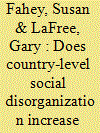

|
|
|
|
|
| Summary/Abstract |
This study examines the effects of a measure of country-level social disorganization on levels of terrorist attacks and fatalities in 101 countries from 1981 to 2010. We measure social disorganization as the presence of state instability: revolutionary and ethnic war, adverse regime change, and genocide. The classic social disorganization perspective posits that individuals experiencing these types of rapid social change will be freed from the institutional and informal restraints that bind them to society, and keep them conforming to social norms and laws. We examine the extent to which this reasoning applies to the number of terrorist attacks and fatalities from terrorist attacks occurring in countries. To control for the possibility that better functioning states are better able to prevent terrorist attacks, we include two measures of state capacity. We find that controlling for state capacity and a wide variety of other variables, social disorganization is consistently associated with increases in terrorist attacks and fatalities. We consider implications of the results for future research and policy.
|
|
|
|
|
|
|
|
|
|
|
|
|
|
|
|
| 4 |
ID:
077131
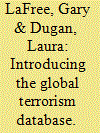

|
|
|
|
|
| Publication |
2007.
|
| Summary/Abstract |
Compared to most types of criminal violence, terrorism poses special data collection challenges. In response, there has been growing interest in open source terrorist event data bases. One of the major problems with these data bases in the past is that they have been limited to international events - those involving a national or group of nationals from one country attacking targets physically located in another country. Past research shows that domestic incidents greatly outnumber international incidents. In this paper we describe a previously unavailable open source data base that includes some 70,000 domestic and international incidents since 1970. We began the Global Terrorism Database (GTD) by computerizing data originally collected by the Pinkerton Global Intelligence Service (PGIS). Following computerization, our research team has been working for the past two years to validate and extend the data to real time. In this paper, we describe our data collection efforts, the strengths and weaknesses of open source data in general and the GTD in particular, and provide descriptive statistics on the contents of this new resource
|
|
|
|
|
|
|
|
|
|
|
|
|
|
|
|
| 5 |
ID:
144889
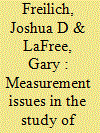

|
|
|
|
|
| Summary/Abstract |
In this article, we introduce readers to a special issue of Studies in Conflict & Terrorism on measurement issues in the study of terrorism. In recent years scholarly interest in terrorism has increased and systematic methods are now more commonly used. Terrorism works that analyze data highlight substantive findings as opposed to measurement issues. A study's substantive findings are only meaningful though if it correctly addresses the measurement issues that invariably arise during the research process. In addition to summarizing the eight articles in this special issue, we outline the strengths and weaknesses of various measurement strategies and assess their contributions to our understanding of terrorism. The major goal is to place the special issue's contributions in context and highlight under-explored issues that future research could address.
|
|
|
|
|
|
|
|
|
|
|
|
|
|
|
|
| 6 |
ID:
112618


|
|
|
|
|
| Publication |
2012.
|
| Summary/Abstract |
Despite concerns about the growing threat posed by domestic radical environmental and animal rights groups to the United States, there has been little systematic quantitative evidence depicting the characteristics of their attacks over time. In this paper we analyze data on 1,069 criminal incidents perpetrated by environmental and animal rights extremists from 1970 to 2007. Based on the Global Terrorism Database's definition of terrorism, we classified 17 percent of these incidents as terrorist. To supplement the analysis, we also conducted interviews with a nonrandom sample of twenty-five activists who self-identified as part of the environmental or animal rights movements. We find that overall, the attacks staged by radical environmental and animal rights groups thus far have been overwhelmingly aimed at causing property damage rather than injuring or killing humans. Further, results from our interviews suggest that activists appear to weigh carefully the costs and benefits of illegal protest. Despite the fact that attacks by environmental and animal rights groups have thus far been almost universally nonviolent, concerns linger that this situation might change in the future.
|
|
|
|
|
|
|
|
|
|
|
|
|
|
|
|
|
|
|
|
|